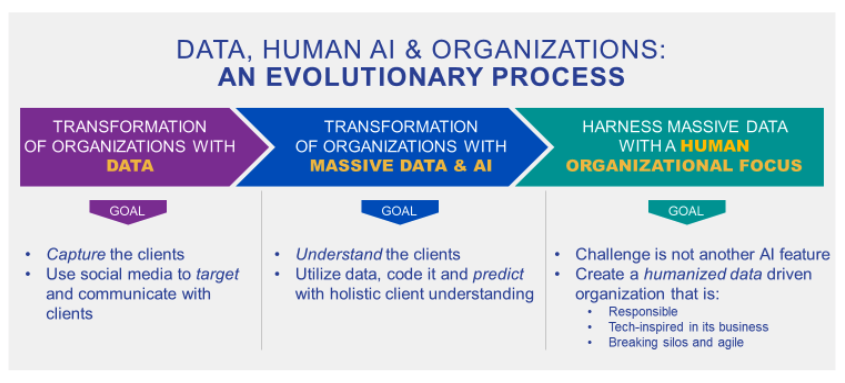Tech companies focused on platforms, AI and big data are missing the human side in their technology-driven outcomes and aspire to “deeptech models”. Meanwhile, market research companies focused on measuring human aspects of opinion, emotions and behavior in purchase, consumption and societal contexts are missing the tech scalability and need to structure “humanised data models”.
Today’s modern brands and organizations will reach exponential growth if they can leverage the full value chain of “deeptech” or “humanised data”. Indeed, they are rebuilding their foundations to compete in the era of data and advanced analytics, defining their new business opportunities with the rise of AI at their core, and shifting from AI tactics to full data transformation, AI-driven, in which changes in technology and the nature of business competition connect.
Organisations must accelerate on this path: a recent MIT and BCG 2019 study reveals that only 20% companies have completed their data transformation (with both teams in AI and some AI products at scale), accounting for a mere two point increase on 2018.
Thus the need is critical to create competitive advantage and value beyond algorithms. We must avoid getting stuck with algorithms and legacy around the algorithms that drive a “so what” issue, disconnected from business people within the organisation, from customers and citizens in markets and society, and from the human dimension. The challenge is to move with data and AI from tactical goals to strategic objectives, from capturing and targeting customers to holistically understanding and predicting customers, from fragmented data and AI projects to embracing critical mass and making the real change.
New models

In this context, MR & Data Insights companies have a responsibility to shift to a humanised data model, to accompany private and public organisations in their data transformation with a people centric approach (consumers, customers, citizens, employees).
Ipsos is highly involved in building a humanised data model within its Total Understanding global transformation programme. We are leveraging data from society, markets and people and pioneering in MR with a new Global Science Organisation deployed since September, committing experts in data science and AI, academics, and partnerships to create leverage in the whole research value chain.
So how do we humanise data in a tech environment?
I would like to share a synthesis of thoughts based on my experience within Ipsos, conversations with many clients from different industries, and at a tech company roundtable I participated in at last month’s Web Aummit on “making the most of data” and a workshop I chaired at the Corporate Innovation Summit on “what is human data”.
The aim is to further exchange with those of you who are interested in the three points below.
First, what’s the real challenge to embrace? The strategic objective of humanised data is to create future value by:
- Creating a trust environment, an organisation relying on ethical AI;
- Creating a “data-inspired” organisation where tech/AI informs, educates and inspires business, and business shares and inspires tech regarding its market, product, competition issues;
- Creating an organisation without silos with a horizontal culture, mirroring the horizontal essence of data, and inspiring HR to evolve from individual performance evaluation systems to a personal drive of collaborative performance in leveraging data.
Second, the data challenge will not be solved with start-up magic only! The challenge relates to the full potential of digital data for competitive advantage and growth. It is not triggered by tech start-ups alone, but instead embraced by large companies and SMEs with a vision and the financial/HR capabilities to integrate data and tech into their value chain. Acceleration and incentivisation by governments are of outstanding value and while there are different government-company models for this in the US and China, there is still room for collaboration (and acceleration) in Europe.
Third, data transformation is not an option for MR agencies, even if data has always been central to their expertise. This is because data becomes massive and real time. The revolution of IoT, of data accessed through the cloud, of capabilities to code voice data, neuro-reactions, photos and videos in addition to structured codes (opinion, CRM…) and of powerful deep learning, push forward MR towards a new analytics paradigm. But MR agencies are not just having a data challenge: they are in a unique position to act on humanised data because of their original skills in knowledge about people. When data is humanised, its impact and decisive power is fully maximised.
T.R.A.K.I.: The five drivers of data actionability
Humanised data relies on enabling five drivers of data actionability (T.R.A.K.I): Truth, Relevance, Accuracy, Knowledge and Integration:
- TRUTH: Managing ethical data and ethical AI: The human approach to selecting data that respects people’s rights, running algorithms that minimise cognitive bias, mixing gender, age, culture. This is naturally aligned with industry professional standards (ESOMAR) and GDPR. It also calls for a true understanding of patterns, making data scientists aware of their own personal bias that must be overcome.
- RELEVANCE: Selecting relevant data: The human approach to selecting the right data source for the right business purpose. This is the reverse of the traditional big data robotic approach that brings all available data together to search for “some” patterns.
- ACCURACY: Aiming for granularity in data analytics: The human role in semantic models of social data for instance, valuing bottom up methods to raise fundamental truths rather than top down methods driven by robots that recognise words out of pre-coded libraries; this increases accuracy, especially with respect to cultural and language differences; the human role is also impactful in data cleaning, or managing GPS data from the perspective of micro individual decisions versus overall data flows that actually hide granular journey patterns.
- KNOWLEDGE: Driving data analytics with an iterative approach using consumer or citizen knowledge: The human role in adjusting models with expert knowledge about markets, and in interpreting analytics in a grounded and sensitive way thanks to familiarity with society, markets, people. Knowledge of market sizing is also critical to assessing the quantitative impact of deep learning patterns.
- INTEGRATION IN THE VALUE CHAIN: Enables transparent and interactive Data Science and AI work between scientists and business analysts: human interactions are critical in the process of algorithm and data integration. This applies to data scientists themselves (who need to share codes and working methods, challenge them openly and avoid making their work opaque and confidential), and between them and business analysts who need to have enough of a basic data culture to work on business challenges with data people. Humanised data is also about driving the data culture and communication within the MR organisation and with brand owners. This integration mindset is key to decision making.

Brands can access the power of humanised data. They just have to check that the MR and data agency process is following the T.R.A.K.I approach, that their basic equipment allows it, like working on Python, and that the humanised data use cases are scaled to a full new way of working.
Humanised data for better decision is paving the way for a new complementarity between MR and data agencies, the GAFA, consulting agencies and advertising agencies. An opportunity for modern MR (today defined by ESOMAR as an $80 Billion market) to play an even more central role in knowledge-based transformation strategies.


